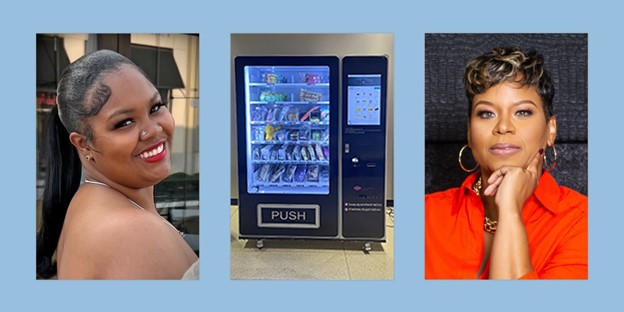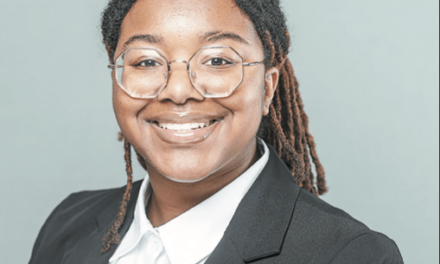Attending colleges ‘in the middle of nowhere’ can present a struggle for Black students who need hair care products.
(Black PR Wire) – When Rahya Kelley isn’t attending classes or practicing with her cheerleading squad at Olivet College, she styles the hair of Black students on campus. But it can be tough for Kelley to access Black hair care products.
Olivet, Michigan, Kelley said, is “in the middle of nowhere.”
There is a Walmart 12 miles from campus, but she said it doesn’t always carry a reliable selection of Black hair care products.
“The only time I was able to go to the beauty supply store was when I went home or if one of my friends were going to the beauty supply store and I would tag along with them,” said Kelley, a rising senior studying business administration.
Then Kelley learned about Beauty Genie — a new company providing vending machines that dispense products like edge control and deep conditioner — from the company’s CEO, Ebony Karim, who is best friends with Kelley’s mother. Kelley, 22, worked with other students in the Hiram Archer Student Success Academy, a mentorship program for students of color, to bring the vending machine to Olivet College, where 18.1% of students are Black.
Beginning Aug. 1, Olivet will be the first college campus to host a Beauty Genie vending machine, stocked with bonnets, combs and other Black hair care items.
While the first Beauty Genie was placed in a Chicago train station earlier this month, the company’s founders saw the opportunity in serving Black students in remote colleges, where personal care products for Black people can be hard to find.
While retailers like Walmart — which have become mainstays in small towns, particularly college towns — do carry some hair care products, many of the items, said Beauty Genie co-founder Quintella Rodgers, are not suitable for Black hair and can cause damage or breakage.

Rodgers, who owns Thee Hair Bar, a salon in Blue Island, Illinois, said many of her college student clients tend to wait until they come during school breaks to style their hair.
“They excited about getting their hair done” because local retailers and drugstores in small college towns rarely carry products suitable for Black hair, she said.
But on campus, the Beauty Genie’s machines will include products from companies such as Luster Products, which has been Black-owned and -operated since 1957, and Mielle Organics, which has skyrocketed in popularity and was recently joined by P&G Beauty. It will also offer kits of paired products, like shampoo and conditioner, or a detangling brush and a comb.
Karim, the CEO and one of Beauty Genie’s co-founders, said this initiative is important because it centers the needs of women of color and encourages them to embrace “our own natural hair texture.”
“I think oftentimes, we don’t have many options,” Karim said. That’s why “being comfortable wearing our hair naturally, not having to always straighten it, being able to purchase products that we don’t have to either travel a long distance for or we don’t have to order them online and wait for them to be shipped” is at the core of the company’s mission, she added.
Aside from the beauty products, the vending machines display short videos from professional hairstylists discussing topics on maintaining hair and the best products to use for each hair type. Managing partner Swanzetta Lewis, who is a braider and has worked in Rodgers’ salon since it opened four years ago, said the Beauty Genie team wants to give students information that they can take back and apply.
“Some students may have not even experienced or even know certain things like possibly how often to get their ends clipped,” Lewis said. “And so, if we can provide tutorials for those kids to take back and know that, it’s also educational for them as well.”
The company is also launching a collegiate ambassador program. Students not only will ensure that the machines stay stocked, but also will learn about entrepreneurship and can participate in marketing the brand on their campuses.
Karim said the Beauty Genie team is “very excited” about having Olivet College as the first college to house their vending machines. Her team also aims to expand to colleges on the East Coast and in the South.
“We’ve been receiving amazing feedback,” Karim said. “I think it’s only just a matter of time before more colleges jump on board.”
They’re also eyeing spots for the vending machines beyond college campuses, including airports or truck stops.
The post Black students at remote colleges still need hair products — enter a vending machine appeared first on AFRO American Newspapers .











